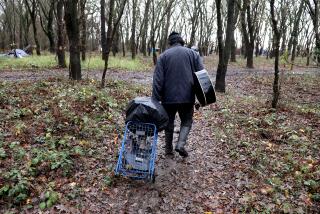As bulldozers near, homeless ministry hangs on
The bulldozers will be here this week to tear down Ray Polk’s homeless ministry.
But then again, they already were here once — and, as Polk sees it, the Lord intervened.
Earlier this month, a local minister protesting the city’s dismantling of four homeless encampments on a rough edge of downtown stumbled upon Polk’s place, with its chapel fashioned of poster board, secondhand display case stocked with free food, and personal memorial to Baby Doll, Mr. Miles and the dozens of other homeless who have died on these streets.
The Rev. Floyd Harris called other ministers and parishioners and told them to come down right away — they had to see this, they had to save it. More than a dozen people circled Polk’s makeshift sanctuary, praying and singing while bulldozers razed a tent city nearby.
The city of Fresno agreed to give Polk a reprieve until Thursday, the scheduled demolition of an abandoned overpass. His sanctuary fronts the entrance to the crumbling old structure.
City officials are adamant that the area be cleared for development.
But Polk doesn’t see it as a done deal.
“The city has their work to do and I have mine,” he said.
The homeless camps, especially the one known as The Hill, had been growing larger, dirtier and more violent over the last two years.
Garbage covered an embankment below the makeshift dwellings, easily visible from California 99, the main route through Fresno. Drug dealers had tents set up for transactions but went back to their homes at night. The few remaining businesses in the area were repeatedly burglarized, and their customers were afraid to patronize them.
“Every kind of person lived out there; some smart and articulate, and some evil and mean beyond belief,” said Michelle Ronzone, 50, who was homeless for years before obtaining housing this month. “Anybody could see the city had to do something.”
Polk’s place was mere blocks from the now-dismantled larger camps, but he kept it clean. He carried a bucket for two blocks to hand-water a flower garden. He painted signs with uplifting Scripture verses. When people came by needing to talk, he listened.
A former appliance repairman, Polk ended up on the streets 22 years ago when he descended into alcoholism after his mother died. Two years later he sobered up and dedicated himself to lending a “kind ear” to the community that had nursed him through despair.
“It’s funny how one person’s ways can change a place,” said Tony “Preacher” Thompson, 54, a homeless man who described himself as Polk’s assistant pastor. “A lot of people out here had given up on people caring for one another, and Ray restored that.”
Polk’s hand-crafted ministry expanded after the city’s last homeless sweep. Three years ago, before razing the camps, city workers handed out vouchers for temporary housing, along with eviction notices.
Polk, 59, thought maybe the time had come for him to go “inside” — hold a regular job. He decided that once everyone else on his block had a voucher, he would get in line. But the vouchers soon ran out. An official with the city’s homeless program told Polk he’d be back for him in four months. He didn’t return.
“I started thinking there must be some reason God wanted to leave me out here at this place, and I started building what he put in my heart,” Polk said. “I didn’t see that city man again until he came out last month. He said, ‘Ray, you ready to get into housing now?’ I said. ‘Sir, I’ve been ready, but I can’t now. I’ve got work to do.’ ”
Gregory Barfield, Fresno’s homeless prevention and policy coordinator, said that this time the city identified 140 housing units available through social agencies and tried before the sweeps to match people in the camps with their different qualification requirements. A city study found 4,400 homeless.
Barfield said the city’s goal is to end homelessness in Fresno within 10 years by obtaining grants and other funding for housing. He said Polk’s ministry can’t stay in the meantime.
“As Brother Ray I’m sure will be the first to tell you, it’s up to God,” he said. “But, unfortunately, because of the demolition it’s impossible for him to stay where he is.”
With the tents of the homeless gone, Polk said he’s busier than before. His clothing shed is nearly empty of donations.
“We’re back to the days of tramps and hobos,” he said. “They’re sleeping at the railroad and crawling into holes in the oleander bushes. You have some people who haven’t slept for days just pushing all their worldly belongings.”
For some homeless individuals, the sweeps were a blessing. A team of social agencies helped Ronzone get into a house.
But dozens of other displaced people have been told by police to move on.
On Thanksgiving, local churches brought Polk food donations. He warmed them up on his grill — an oil drum with a cross cut into the side. He served chicken with stuffing, baked beans, tamales and green beans. He even placed vases of flowers next to the plastic forks.
“I don’t know what all he put in those beans, but they were really good,” said Levi, 42, who didn’t give a last name. He said that when he “gets into it with my lady friend, Ray’s is the only place I have to go. Ray’s real quiet, but he’s really smart. And he listens to you.”
When Levi finished eating his holiday dinner, Polk handed him a bouquet that came with food donations from Trader Joe’s. “Here, go get rid of these flowers,” he told him. “Give them to a lady who needs cheering up.”
“He’s funny like that. He figures stuff out,” Levi said.
Thompson went to a family member’s home for dinner but returned to Polk’s for the companionship because “he doesn’t make you feel like an outcast.”
The city has offered to move Polk’s memorial and ministry if a church or other organization volunteers to give them a home. If not, they will hold the items in storage for 90 days before destroying them.
But Polk doesn’t seem too concerned. He’s busy decorating for Christmas.
More to Read
Start your day right
Sign up for Essential California for news, features and recommendations from the L.A. Times and beyond in your inbox six days a week.
You may occasionally receive promotional content from the Los Angeles Times.







